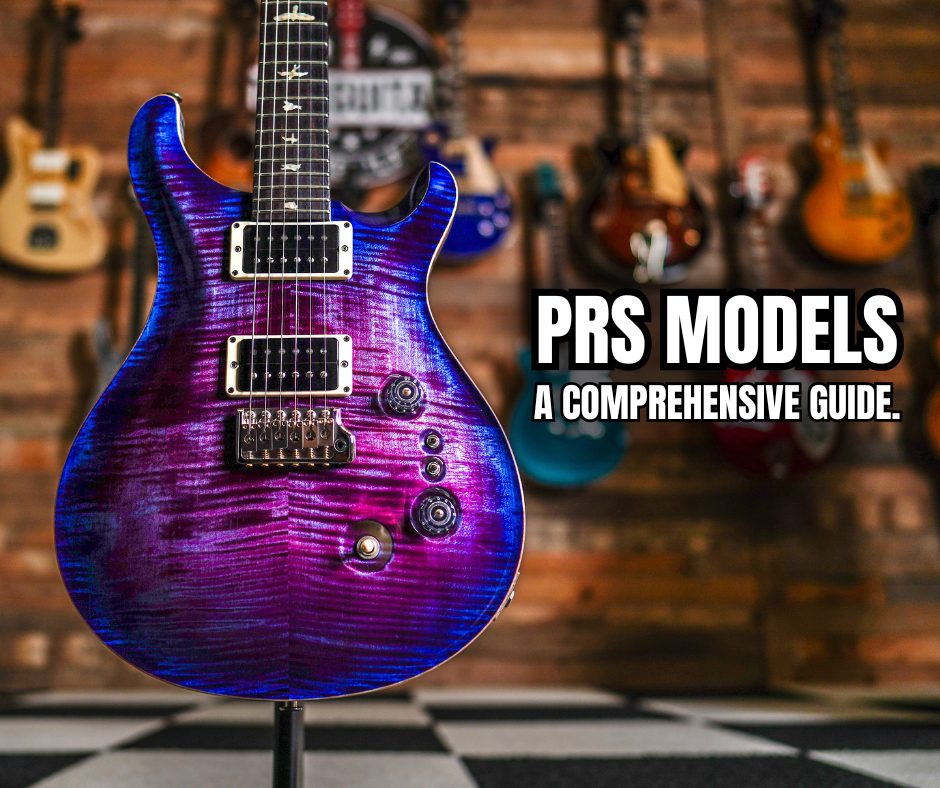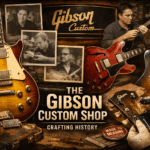PRS Guitar Models: A Comprehensive Guide
1. PRS Custom 24
• Introduction: 1985
• Overview: The PRS Custom 24 is the flagship model and the first guitar Paul Reed Smith ever brought to market. Its introduction in 1985 marked the debut of the PRS brand and has since become iconic for its exceptional build quality and tonal versatility.
• Key Features:
• Body: Mahogany with a maple top
• Neck: Wide Thin or Pattern Regular
• Pickups: PRS 85/15 or 58/15 pickups
• Scale Length: 25 inches
• Notable Specs: 24 frets (hence the name), PRS’s patented tremolo bridge, and bird inlays.
• Sound: The Custom 24 is versatile, with balanced tone suitable for both clean and distorted sounds, making it ideal for rock, jazz, and metal.
• Significance: The Custom 24 set the PRS standard and became the go-to model for musicians worldwide, including notable artists like Carlos Santana and Mark Tremonti.
2. PRS McCarty Series
• Introduction: 1994
• Overview: Named after Ted McCarty, former president of Gibson and a mentor to Paul Reed Smith, the McCarty Series pays homage to vintage guitar designs. This model combines vintage aesthetics with PRS’s modern approach.
• Key Features:
• Body: Mahogany with thicker maple tops
• Neck: Pattern neck profile, closer to vintage guitars
• Pickups: PRS 58/15 LT pickups, known for lower output and vintage tone
• Scale Length: 25 inches
• Notable Specs: Typically features PRS’s stoptail bridge or a fixed bridge
• Sound: Known for warmer tones and slightly lower output, making it perfect for blues, classic rock, and jazz.
• Significance: The McCarty models reflect Paul’s admiration for vintage craftsmanship, giving a PRS twist to traditional sounds.
3. PRS SE Series
• Introduction: 2001
• Overview: The PRS SE (Student Edition) line was introduced to provide a more affordable PRS option without sacrificing quality. Manufactured overseas, the SE Series offers great build quality and is accessible to a broader range of players.
• Key Features:
• Body: Mahogany with a maple veneer top
• Neck: Wide Thin neck profile, offering a comfortable, fast feel
• Pickups: PRS-designed pickups, offering versatility
• Scale Length: 25 inches or 24.5 inches, depending on the model
• Notable Specs: Often includes PRS’s iconic bird inlays, available in single-cut, double-cut, and even semi-hollow body options.
• Sound: While not as customizable as core PRS models, SE guitars cover a wide tonal range and can handle anything from pop to metal.
• Significance: The SE Series made PRS guitars attainable for a wider audience, without compromising on the core qualities of PRS.
4. PRS Silver Sky
• Introduction: 2018
• Overview: The Silver Sky was a collaboration between Paul Reed Smith and John Mayer. This model pays homage to classic single-coil guitars of the ‘60s, particularly Mayer’s own preferences for vintage-style tones and ergonomics.
• Key Features:
• Body: Alder, with a bolt-on maple neck
• Neck: 635JM neck shape, designed to Mayer’s specifications
• Pickups: 635JM single-coils, delivering a vintage-inspired sound
• Scale Length: 25.5 inches
• Notable Specs: Classic vintage-style tremolo, locking tuners, and smaller PRS bird inlays.
• Sound: The Silver Sky is well-known for its glassy, strat-like tones, ideal for blues, pop, and rock.
• Significance: With the Silver Sky, PRS ventured into the realm of vintage single-coil tone and attracted a new demographic of players looking for classic sounds in a modern build.
5. PRS S2 Series
• Introduction: 2013
• Overview: The S2 line aims to balance affordability and PRS craftsmanship. Built in the U.S. but with cost-effective design choices, the S2 Series is between the SE and Core PRS lines.
• Key Features:
• Body: Mahogany with a thinner maple top
• Neck: S2 neck profile
• Pickups: Custom-wound PRS S2 pickups, designed for tonal balance
• Scale Length: 25 inches
• Notable Specs: Thinner maple top and streamlined hardware, which reduce manufacturing costs
• Sound: Versatile tones that cater to both rock and pop, maintaining a more modern sound profile compared to vintage-inspired PRS models.
• Significance: The S2 Series offers a high-quality, U.S.-made PRS guitar without the premium price of the Core line.
6. PRS Private Stock
• Introduction: 1996
• Overview: The PRS Private Stock program is the pinnacle of PRS craftsmanship, where customers can work with PRS to build fully custom, one-of-a-kind instruments. These guitars often feature rare woods, unique finishes, and customized hardware.
• Key Features:
• Customization: Every aspect can be customized, from body wood to inlays to hardware
• Pickups: Custom-wound pickups to match tonal preferences
• Scale Length: Customizable, though 25 inches is common
• Notable Specs: Exquisite materials and craftsmanship, often with ornate inlays, exotic woods, and unique finishes.
• Sound: Tailored to each customer’s preferences, offering the ultimate flexibility in tone.
• Significance: The Private Stock models represent PRS’s dedication to perfection and its reputation for high-end, bespoke guitars.
Conclusion
Each PRS guitar model has a unique story, tone profile, and purpose. Whether it’s the iconic Custom 24 or the vintage-inspired McCarty, PRS has consistently crafted guitars with precision and innovation. From the affordable SE Series to the highly customized Private Stock, PRS guitars provide options for players of every level, making them an enduring favorite in the world of electric guitars.
By understanding the history and features of each model, musicians can make an informed decision about which PRS guitar best fits their style and needs.







